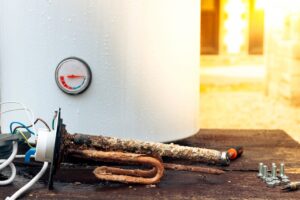Boilers are excellent ways to heat your home, but they don’t last forever. Much like traditional HVAC systems, boilers can and will eventually become subject to mechanical failure. But how can you tell when that starts?
Before you need heating service in Hamilton, OH, it’s a good idea to know what to look for so you can hopefully avoid major breakdowns and expensive repair bills for your boiler. Let’s go over them now.
It’s Old
That may seem very on-the-nose, but the best way to tell if your boiler is on its way out is by its age. Boilers last for around 15-20 years on average, but as they enter the latter half of their lifespan, you’ll find that repairs become a lot more common.
The need for repairs is inevitable, but it’s when they become more frequent that it no longer makes sense to keep throwing money at a system that’s declining. You’re better off reaping the benefits of a brand-new boiler and so long as it’s maintained regularly, you won’t have to worry about repair costs for a while.
Odd Sounds
If your boiler isn’t operating properly, you’ll be able to hear it. While it can make a few noises every now and again, abnormal and prolonged sounds are usually a cause for concern. If the sound is loud or peculiar enough that you’ve noticed it, your boiler should be inspected.
Weird sounds could be a result of sediment buildup in your boiler, or by a component that’s on its last leg and is about to give out. A technician will be able to tell you for sure after they take a look at it.
Poor Ongoing Efficiency
The less efficient a boiler is, the more it has to work to achieve the desired result which is the temperature you set the thermostat to. With lower efficiency comes greater wear and tear.
The number one way you’ll notice an inefficient boiler is if it seems to just not shut off during heating cycles, or if your energy bills start to climb sharply. It’s expected that you’ll spend more money on your boiler as it ages, but abrupt bill increases are a sign that something else is wrong.
Visible Leaks
It’s not uncommon for some water to drip out of the TPR valve, but after a certain point, the water coming out may be considered excessive. If there are puddles of water you can splash in, or the amount of water coming from your TPR valve exceeds what you’ve ever seen before, it’s time to call a professional.
Water leaks normally mean that the temperature and pressure relief valve (aka the TPR valve) or an O-ring need to be replaced, which is simple enough. But it could also point to issues within the boiler that need more extensive repairs (or full replacements).
Know the Signs Ahead of Time
Always be on top of your boiler’s potential for failure so you aren’t blindsided when it eventually happens. While you can’t avoid it, you can prevent it with maintenance. After your boiler repair, talk to us about setting up a standard annual maintenance schedule so you stand the best chance of not enduring boiler breakdowns in the future.
Contact JM Mechanical Heating & Cooling today to schedule your boiler repair or replacement as soon as possible.

